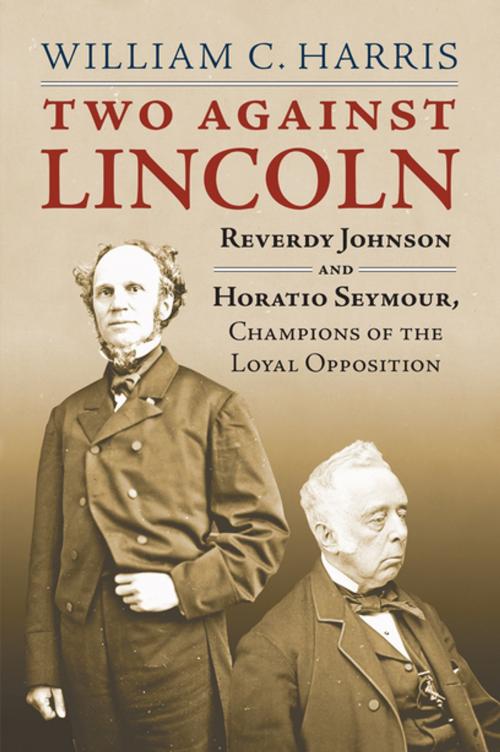Two against Lincoln
Reverdy Johnson and Horatio Seymour, Champions of the Loyal Opposition
Nonfiction, History, Americas, United States, Civil War Period (1850-1877), Social & Cultural Studies, Political Science, Government| Author: | William C. Harris | ISBN: | 9780700624133 |
| Publisher: | University Press of Kansas | Publication: | April 14, 2017 |
| Imprint: | University Press of Kansas | Language: | English |
| Author: | William C. Harris |
| ISBN: | 9780700624133 |
| Publisher: | University Press of Kansas |
| Publication: | April 14, 2017 |
| Imprint: | University Press of Kansas |
| Language: | English |
Reverdy Johnson (1796–1876), Maryland senator, and Horatio Seymour, Democratic governor of New York, were two influential opponents of Abraham Lincoln and the Republicans during the Civil War. But unlike the Copperheads, they staunchly supported the war to suppress the rebellion. The story of these two figures of the loyal opposition by Lincoln Prize-winning author William C. Harris provides a new way of understanding critical controversies relating to the purpose of the Civil War, its conduct, emancipation, white racial opinion, loyalty, military conscription, and civil liberties.
Johnson, a distinguished lawyer, former Whig, and conservative Unionist, did not believe that the secessionist states had left the Union, an idea with broad implications for post-war reconstruction. Like Seymour, he opposed Republican efforts in Washington to end slavery, assuming such a policy would backfire against the Union. However, Johnson in 1864 spoke in favor of the Thirteenth Amendment to abolish slavery. Before the war, Seymour supported Stephen Douglas's popular sovereignty policies, allowing the territories to decide whether or not to permit slavery, and during the war he opposed any tampering with slavery. Two Against Lincoln explores how these two men negotiated issues of emancipation, reconstruction, and reconciliation, all while navigating the roiling currents of partisan politics. The book includes illuminating accounts of the framing of the Fourteenth Amendment in 1866, the ephemeral National Union (Democratic) Party of 1866, the role of Senator Johnson in the approval of the military reconstruction acts of 1867, the impeachment of President Andrew Johnson, and, finally, the presidential election of 1868 in which Seymour as the Democratic candidate did better than expected against war hero U. S. Grant.
Building on the author’s award winning work on Lincoln and the border states, Two Against Lincoln illustrates the complexity of political divisions in the Union states, as embodied in two powerful, controversial leaders of the time.
Reverdy Johnson (1796–1876), Maryland senator, and Horatio Seymour, Democratic governor of New York, were two influential opponents of Abraham Lincoln and the Republicans during the Civil War. But unlike the Copperheads, they staunchly supported the war to suppress the rebellion. The story of these two figures of the loyal opposition by Lincoln Prize-winning author William C. Harris provides a new way of understanding critical controversies relating to the purpose of the Civil War, its conduct, emancipation, white racial opinion, loyalty, military conscription, and civil liberties.
Johnson, a distinguished lawyer, former Whig, and conservative Unionist, did not believe that the secessionist states had left the Union, an idea with broad implications for post-war reconstruction. Like Seymour, he opposed Republican efforts in Washington to end slavery, assuming such a policy would backfire against the Union. However, Johnson in 1864 spoke in favor of the Thirteenth Amendment to abolish slavery. Before the war, Seymour supported Stephen Douglas's popular sovereignty policies, allowing the territories to decide whether or not to permit slavery, and during the war he opposed any tampering with slavery. Two Against Lincoln explores how these two men negotiated issues of emancipation, reconstruction, and reconciliation, all while navigating the roiling currents of partisan politics. The book includes illuminating accounts of the framing of the Fourteenth Amendment in 1866, the ephemeral National Union (Democratic) Party of 1866, the role of Senator Johnson in the approval of the military reconstruction acts of 1867, the impeachment of President Andrew Johnson, and, finally, the presidential election of 1868 in which Seymour as the Democratic candidate did better than expected against war hero U. S. Grant.
Building on the author’s award winning work on Lincoln and the border states, Two Against Lincoln illustrates the complexity of political divisions in the Union states, as embodied in two powerful, controversial leaders of the time.















